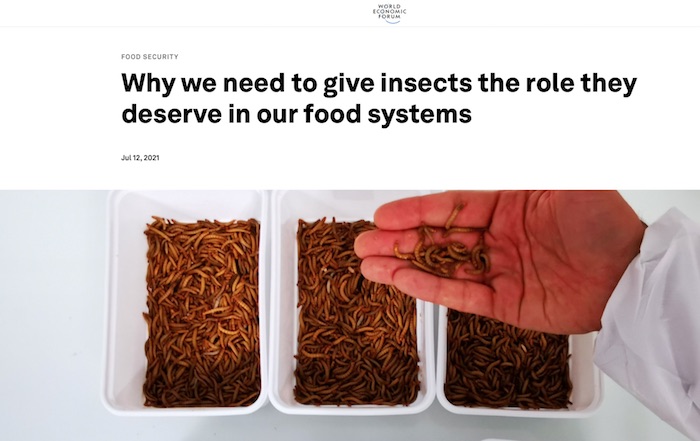Opinion
The federal government wants Canadians to eat bugs.

A few (very few) media outlets have picked up on this recent news release from the Canadian Taxpayers Federation regarding the human consumption of.. Bugs!
Yuck right? Well don’t panic. They’re not quite ready to swap your bowl of Count Chocula for cocoa-flavoured crickets just yet. However it does appear the Liberal government is hoping to put bugs on your menu. The article from the CTF is included below so I urge you to read on because it’s really interesting (and for those with a queasy stomach, just a tad disturbing).
But before you do that, a couple of observations.
First. This is NOT another win for the annoying conspiracy theory people. Sure they may have been spouting off about forcing us to eat bugs, but that doesn’t make this a classic conspiracy theory.
When it comes to conspiracy theories, most of us have always concluded there are just two types of people. There are the KOOKS. And then there are the people who do their best to avoid the kooks. Let’s call the first group the Flat Earthers, and the second group, Everyone Else (or the Rest of Us if you please).
Flat Earthers use evidence no one can verify to draw ridiculous conclusions and make strange accusations. Governments insisting we eat bugs may sound like a ridiculous conclusion formed by evidence no one can verify, but it turns out this is not the case at all.
Why is it that “The Liberal Government Wants Us To Eat Bugs” is not a ‘classic’ conspiracy theory?
Well it’s because of the words ‘conspiracy’ and ‘theory’. They just don’t apply.
The Oxford Dictionary defines conspiracy as “a secret plan by a group of people to do something harmful or illegal.” For one thing there’s nothing illegal about adding bugs to our diet. We’ve never had to make a law about it. Politicians like getting elected, and so it never occurred to them to force bugs onto our plates. Sure you’ll see them flipping pancakes and picking hot dogs off a bbq, but that’s about as ‘harmful’ as they’re willing to get. So there’s nothing illegal and nothing harmful going on. That leaves the part about being a secret.
To prove this isn’t a secret I’m afraid I’m going to have to put 2 and 2 together because we have to talk about the World Economic Forum. They might not be shouting it from the mountaintops, but the World Economic Forum isn’t hiding the fact they’d like us to replace meat protein with bugs. It’s only a secret if you’ve never taken the time to read “Why we need to give insects the role they deserve in our food systems“, or “5 reasons why eating insects could reduce climate change“.
You might think our trusted sources of information would look into this because food is something their readers tend to eat almost every day. Sometimes more than once. They might not even have to go to Davos to check it out. News reporters bump into Deputy PM Chrystia Freeland in the hallways on Parliament Hill all the time. Chrystia Freeland is on the World Economic Forum Board of Trustees If you click the link you can see her there, third person down on the right. If Deputy PM Freeland doesn’t know where to find these articles on the WEF website, as a Board of Trustee member she’ll know who to ask. So this certainly isn’t illegal or particularly harmful, and it’s only a secret to those who don’t read these things or have these things read to them by the information sources we’ve always trusted. The Liberal government might not talk about sharing goals with the WEF every day, but when Canada’s Deputy PM is on the WEF’s Board of Trustees let’s just say it would be odd to think they’re at odds.
The other word in play here is “theory”. When it comes to “conspiracy theory”, the word theory means “theoretical”, as in a theory, but not really happening. Again with the Oxford, second meaning applies here, “that could possibly exist, happen or be true, although this is unlikely”.
One could make a weak argument that Canada’s Deputy PM only goes to Davos to exchange stories with the rich and famous about how ridiculously hard it is to drive the speed limit in Alberta. One ‘theory’ is that she had to make it all the way back to Ottawa in an EV before it got cold. Regardless. Canada’s Deputy PM is a member of the WEF Board of Trustees. So although it could be a coincidence, it is not a theory that the federal government is funding bug – food research. As you’ll see below, the liberals are paying companies to ” promote the consumption of “roasted crickets” or “cricket powder” mixed-in with your morning bowl of cereal. ”
The fact the WEF has been talking about this for years now, the fact our Deputy Prime Minister is on the WEF Board of Trustees, and the fact the federal government is now funding research meant to change Canadians from people who stomp on bugs into people who chomp on bugs.. Well that pretty much takes the theoretical part right out of it.
Now that you’re hungry for more, here is the news release from a new trusted information source, the CTF.
By Ryan Thorpe of the Canadian Taxpayers Federation
Taste the crunch: cricket corporate welfare cost $420K

Bon apétit.
The federal government spent $420,023 since 2018 subsidizing companies that turn crickets into human food.
“Canadians are struggling as inflation pushes up grocery bills, but subsidizing snacks made out of bugs doesn’t sound like the right solution for taxpayers,” said Franco Terrazzano, CTF Federal Director. “If Prime Minister Justin Trudeau wants to take a bite out of crunchy crickets, he can do it without taking a bite out of taxpayers’ wallets.”
The Canadian Taxpayers Federation gathered the list of cricket corporate welfare deals by reviewing the federal government’s proactive disclosure of grants and contributions.
On two separate occasions, the feds cut cheques to a Montreal-based company called NAAK Inc., for a combined cost to taxpayers of $171,695.
The co-founders of NAAK were “introduced … to the benefits of adding insects to (their) diet” by a friend and describe their mission as “democratizing insect consumption.”
NAAK specializes in “cricket energy bars,” but a portion of its corporate welfare money was earmarked for developing other cricket products, including “steaks, sausages and falafels.”
NAAK is one of five companies producing crickets for human consumption that have received corporate welfare deals from the feds in recent years.
Table: Corporate welfare deals, 2018-2022
|
Company |
Number of subsidies |
Total cost of subsidies |
|
NAAK Inc. |
2 |
$171,695 |
|
Entologik Inc. |
2 |
$88,979 |
|
Prairie Cricket Farms |
2 |
$78,349 |
|
Gaia Protein |
1 |
$42,000 |
|
Casa Bonita Foods |
1 |
$39,000 |
Casa Bonita Foods wants to “manufacture high protein snacks made with cricket flour,” while Prairie Cricket Farms promotes the consumption of “roasted crickets” or “cricket powder” mixed-in with your morning bowl of cereal.
The founder of Entologik claims insects are the “protein of the future” and wants to grow the company into “the largest producers and processor of edible insects in Canada.”
“The feds are having their ‘let them eat crickets’ moment,” Terrazzano said. “If someone can sell crickets as food, we wish them the best of luck, but taxpayers shouldn’t be paying for it.”
An additional $8.7 million in subsidies went to Aspire Food Group, which operates a cricket processing plant in London, Ont. In total, the company received four separate handouts.
While the company is primarily geared toward pet food production, its owner said about 10 per cent of its business uses crickets for human food.
Dr John Campbell
Cures for Cancer? A new study shows incredible results from cheap generic drug Fenbendazole

From Dr. John Campbell
You won’t hear much about Fenbendazole from the regular pipeline of medical information. There could be many reasons for that. For one, it’s primarily known for it’s use in veterinary medicine. Somehow during COVID the medical information pipeline convinced millions that if a drug is used on horses or other animals it couldn’t work for humans. Not sure how they got away with that one considering the use of animal trials for much of modern medical history.
Another possible reason, one that makes at least as much sense, is that there’s no business case for Fenbendazole. It’s been around for decades and its patent expired in the early 1990’s. That means it’s considered a generic drug that a pharmaceutical company from India could (and does) produce in mass quantities for very little profit (compared to non-generics).
So Fenbendazole is an inexpensive, widely accessible antiparasitic drug used in veterinary medicine. During the COVID pandemic a number of doctors, desperate for a suitable treatment, tried it with reportedly great levels of success. Over some time they discovered it might be useful elsewhere. Some doctors are using Fenbendazole to help treat late stage cancer. Often this is prescribed when the regular treatments clearly aren’t working and cancer is approaching or has already been declared stage 4.
What they’ve found at least in some cases is astounding results. This has resulted in a new study which medical researcher Dr. John Campbell shares in this video.
Energy
It should not take a crisis for Canada to develop the resources that make people and communities thrive.

From Resource Works
Canada is suddenly sprinting to build things it slow-walked for a decade.
“Canada has always been a nation of builders, from the St. Lawrence Seaway to Expo 67. At this hinge moment in our history, Canada must draw on this legacy and act decisively to transform our economy from reliance to resilience. We are moving at a speed not seen in generations,” announced Prime Minister Mark Carney at the end of August.
He was echoed by British Columbia Premier David Eby shortly after.
“There’s never been a more critical time to diversify our economy and reduce reliance on the U.S., and B.C. is leading the way in Canada, with clean electricity, skilled workers and strong partnerships with First Nations,” the premier stated after his government approved the Ksi Lisims LNG project, led by the Nisga’a nation.
In the face of President Donald Trump’s tariffs, Ottawa has unveiled a first wave of “national projects” that includes an expansion of LNG Canada to 28 million tonnes a year, a small modular reactor at Darlington, two mines, and a port expansion, all pitched as a way to “turbocharge” growth and reduce exposure to a trade war with the United States.
The list notably excludes new oil pipelines, and arrives with rhetoric about urgency and nation-building that begs a simple question: why did it take a crisis to prioritize what should have been routine economic housekeeping?
The most tangible impact of resource projects can be observed in the impact it has on communities. The Haisla Nation is enjoying an economic renaissance with their involvement in the LNG Canada project on their traditional lands, which became operational in June.
Furthermore, the Haisla are set to unveil their own facility, Cedar LNG, in 2028. Already, the impact of employment and strong paycheques in the community is transforming, as former Haisla Chief Councillor Crystal Smith as attested many times.

Former Haisla Chief Councillor Crystal Smith.
“Let’s build a bright and prosperous future for every Canadian and every Indigenous person that wants to be involved, because change never happens inside of our comfort zones, or the defensive zone,” said Crystal Smith at a speech delivered to the 2025 Testimonial Dinner Award on April 24 in Toronto.
Fortunately, the new pro-resource posture has a legislative backbone. Parliament passed the One Canadian Economy Act to streamline approvals for projects deemed in the national interest, a centrepiece of the government’s plan to cut internal trade barriers and fast-track strategic infrastructure.
Supporters see it as necessary in a period of economic rupture, while critics warn it risks sidelining Indigenous voices in the name of speed. Either way, it is an admission that Canada’s previous processes had become self-defeatingly slow.
British Columbia offers a clear case study. Premier David Eby is now leaning hard into liquefied natural gas. His government and Ottawa both approved the Nisga’a Nation-backed Ksi Lisims LNG project under a “one project, one review” approach, with Eby openly counting on the Nisga’a to build support among neighbouring nations that withheld consent.
It is a marked turn from earlier NDP caution, framed by the premier as a race against an American Alaska LNG push that could capture the same Asian markets.
Yet the pivot only underscores how much time was lost. For years, resource projects faced overlapping provincial and federal hurdles, from the Impact Assessment Act’s expanded federal reach to the 2018 federal tanker ban on B.C.’s north coast.
Within B.C., a thicket of regulations, policy uncertainty, and contested interpretations of consultation obligations chilled investment, while political positions on pipelines hardened. Industry leaders called it “regulatory paralysis.” These were choices, not inevitabilities.
The national “go-fast” stance also arrives with unresolved tensions. Ottawa has installed a Calgary-based office to clear and finance major projects, led by veteran executive Dawn Farrell, and is touting the emissions performance of LNG Canada’s expansion.

Dawn Farrell, head of the Major Projects office in Calgary.
At Resource Works, we wholeheartedly endorsed the move, given the proven ability and success of Dawn Farrell in the resource industry. It must also be acknowledged that the major projects office will only be an office unless it meaningfully makes these projects happen faster.
A decade that saw eighteen B.C. LNG proposals produced one major build, and moving to LNG Canada’s second phase is entangled with power-supply constraints and policy conditions. That slow cadence is how countries fall behind.
If the current urgency becomes a steady habit, Canada can still convert this scramble into lasting capacity. If not, the next shock will find us sprinting again, only further from the finish line.
Resource Works News
-

 Energy12 hours ago
Energy12 hours agoIt should not take a crisis for Canada to develop the resources that make people and communities thrive.
-

 Alberta1 day ago
Alberta1 day agoChatGPT may explain why gap between report card grades and standardized test scores is getting bigger
-

 Fraser Institute1 day ago
Fraser Institute1 day agoCourts and governments caused B.C.’s property crisis—they’re not about to fix it
-

 International2 days ago
International2 days agoIs America drifting toward civil war? Joe Rogan thinks so
-

 Alberta20 hours ago
Alberta20 hours agoFederal budget: It’s not easy being green
-

 Censorship Industrial Complex2 days ago
Censorship Industrial Complex2 days agoEU’s “Democracy Shield” Centralizes Control Over Online Speech
-

 International2 days ago
International2 days agoUS announces Operation Southern Spear, targeting narco-terrorists
-

 International2 days ago
International2 days agoBondi and Patel deliver explosive “Clinton Corruption Files” to Congress





